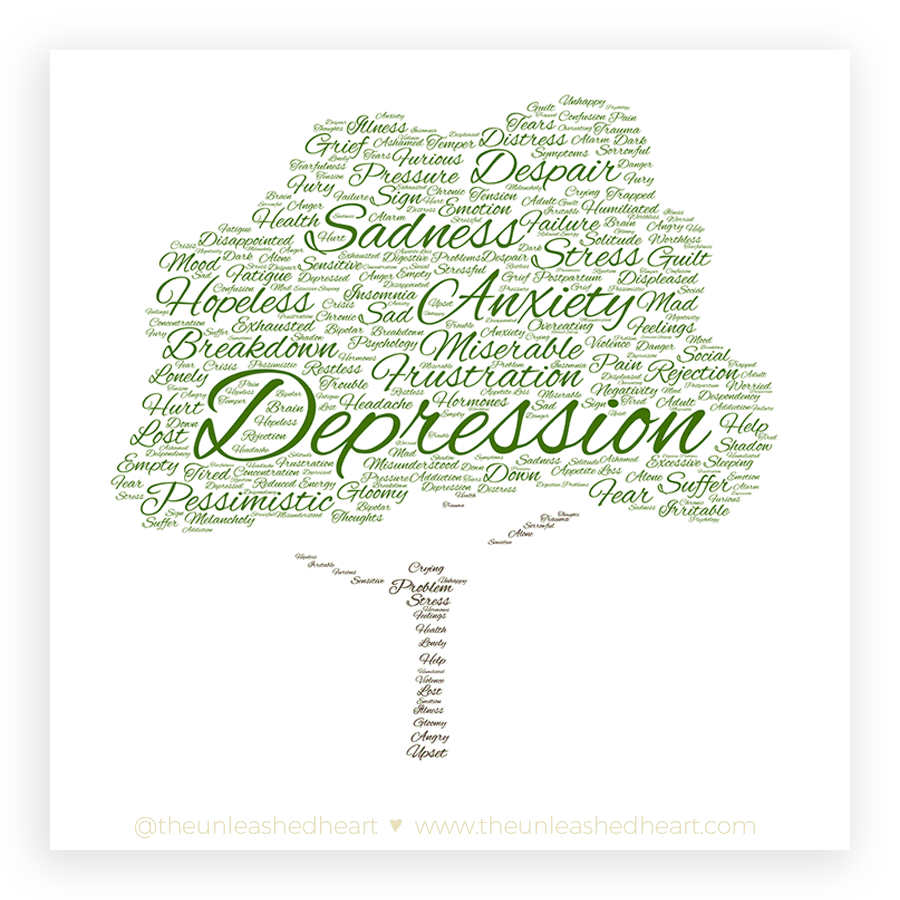Sadness, despair, grief, melancholy, misery, etc.
Take note of all of the feeling words in the tree of grief. How many you’ve experienced throughout your life?
I imagine you’ve experienced all of them throughout your life.
Recently on social media, I had a request to address the feeling of sadness, which was prompted by the reader referencing the blog post, How to Own Your Feelings, published in May (Mental Health Awareness Month).
I needed some inspiration for this week anyway, so it was perfect timing. If you ever want to learn more about a particular aspect of grief or want me to dig more deeply into a covered topic, please don’t hesitate to share with me! I’m open to all requests!
Why do we feel sadness or any number of feelings shown here in the tree word cloud image?
The root of sadness is, you guessed it, grief.
There is no timeline for grief. Often, when we hear this, we may think about the long-term. However, what about short-term grief as well? You don’t have to be a (nearly) life-long griever like myself to identify yourself as a griever. And, there is ZERO SHAME in identifying yourself as a griever. When your life patterns have changed due to Covid-19, lose a home in a fire or a job (or don’t get hired for the dream job) – there’s grief.
I’ve mentioned this definition (or description) of grief given to us by The Grief Recovery Institute many times. However, I’ll repeat it if you’ve never come across this definition before.
Grief is anything we wish would be different, better, or more. And, it’s also the net result of the loss of hopes, dreams, and expectations.
The words in the image fall under the umbrella of one word – GRIEF. In a nutshell, the root of all of these feelings is grief. And, when we start to look at all these feelings, we can begin to apply new knowledge and tools to process them.
You may think, “But no one died; I’m not a griever.”
You do not have to experience the death of a loved one to experience grief. Go back and re-read that definition again.

You may feel hopeless, depressed, or anxious after being diagnosed with a chronic illness such as diabetes.

You may feel fear, stress, and anxiety about the future if, like many are this weekend, you are graduating from high school or are about to embark on a transition in life.
And, when you add that we are all in a relationship with others, do you think that others may also project their feelings onto us? Do you believe we may struggle to have a relationship where we fully feel seen, heard, and not judged, criticized, or analyzed for our feelings?
All of this to say, this is why I am so passionate about education about grief. Relationships and lives depend on this education. That may sound dramatic; however, if I were to share some stats with you on child grief as they relate to the A.C.E. Study, you’d be shocked. Or, the stats of addiction, homelessness, or broken homes – you would agree that grief is, and always has been society’s pandemic.
We should all be concerned with grief because it is a social, economic, and health concern.
 So, what do we do about this?
So, what do we do about this?
- Acknowledge what we’re feeling to ourselves, so we can tell others the emotional truth.
- Seek knowledge and tools for processing these feelings in ways that individually resonate.
- Look at your belief system. What were you taught about these feelings? Did you learn that feeling sad was a bad thing? Or that the only solution to depression is popping a pill? As a child who experienced trauma or loss, did you act out in anger and were applied the label of a “problem child?” We all know if we’re told something enough times, we start to believe it, right?
- What behaviors are you participating in that are a way to distract yourself from these painful feelings? What behaviors do you want to change to improve your life – emotionally, physically, mentally, and spiritually?
We all grieve something or someone; therefore, we are all grievers. When we look at each other in this way, we see each other differently. We recognize that, as humans, we do have a lot in common, regardless of the boxes we check on various applications we fill out.
Grief does not discriminate. And, heart to heart, we shouldn’t either.
Thank you for the suggestion, dear reader. At the beginning of this post, I almost wrote on a similar (but different) topic. So, next week come back for the blog post The Mind-Body Connection. I’ll have a personal story to share with you.
Until then, look out with eyes of compassion. We’re all struggling with something.

P.S. I will be receiving training for The Grief Recovery Institute’s new program they’re rolling out online – Helping Children with Loss. It’s a 4-week/session, online GROUP program. I am so excited to get trained and offer this program online. As a grieving child and now a grief specialist, I know the importance of addressing grief in children. This program is PREVENTION. This program is perfect for parents/caretakers of grieving children, Foster programs, School administration, Head Start Programs, Military families, etc. These are a few ways I would love to spread this program. If this is something you feel your children or children in your care need, please get in touch via the Contact tab.
P.P.S. Check out this blog post previously referenced. Scroll down, and you’ll find a FREE Feelings Chart to download – no details required. 🙂

